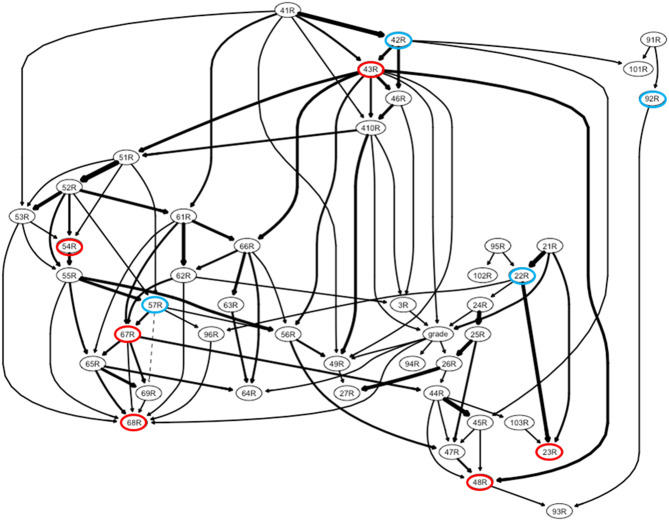Figure 1.
A directed acyclic graph of changes in lifestyle, personal attitudes, perceived stress, anxiety, and depressive mood among Korean medical students during the COVID-19 pandemic. The following six most influential items are marked with red circles: (1) personal attitude, fear of infecting my colleagues (R23); (2) perceived stress, feeling nervous and stressed (R43); (3) perceived stress: feeling “being on top of things” (R48); (4) anxiety, trouble relaxing (R54); (5) depressive mood, feelings of failure or that I have let myself/family members down (R67); and (6) depressive mood, trouble concentrating on things such as reading the newspaper or watching television (R68). [Personal attitude for COVID-19 pandemic] 21R = fear of my getting COVID-19; 22R = fear of my transmitting COVID-19 to family; 23R = fear of my transmitting COVID-19 to colleague; 24R = my keeping social distance; 25R = my keeping personal hygiene; 26R = feeling proud for medical staff at frontline; 27R = my willing to future volunteer at frontline/3R = intension of school dropout within recent 3 months; grade = grade as medical student/[Perceived stress] 41R = upset; 42R = unable to control; 43R = nervous or stressed; 46R = cannot cope with many things have to be done; 49R = angered for things outside of one's control; 410R = felt difficulties piled up could not be overcome; 44R = confidence for personal problems; 45R = things going one's way; 47R = control irritation; 48R = on the top of things/[Anxiety] 51R = nervous or anxious; 52R = cannot stop control worrying; 53R = worrying too much for different things; 54R = trouble relaxing; 55R = restless; 56R = easily annoyed or irritable; 57R = afraid of awful things happen/ [Depressive mood] 61R = feeling down, depressed, or hopeless; 62R = little interest or pleasure in doing things; 63R = trouble falling asleep or staying too much sleep; 64R = poor appetite or overeating; 65R = psychomotor change; 66R = tired or little energy; 67R = feel bad about oneself; 68R = trouble concentrating; 69R = idea of suicide or harming oneself/[Spare time activities in COVID-19 pandemic] 91R = sleep; 92R = computer game; 93R = reading; 94R = study; 95R = exercise; 96R = spend time with family and friends; /[Difficulties of participating in online classes in COVID-19 pandemic] 101R = maintaining regular daily routine; 102R = insufficient interaction for understanding; 103R = restriction of on-site social activities.

